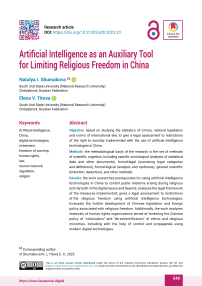Artificial Intelligence as an Auxiliary Tool for Limiting Religious Freedom in China
Автор: Shumakova N. I., Titova E. V.
Журнал: Journal of Digital Technologies and Law @lawjournal-digital
Статья в выпуске: 1 (2), 2023 года.
Бесплатный доступ
Objective: based on studying the statistics of crimes, national legislation and norms of international law, to give a legal assessment to restrictions of the right to worship implemented with the use of artificial intelligence technologies in China. Methods: the methodological basis of the research is the set of methods of scientific cognition, including specific sociological (analysis of statistical data and other documents), formal-legal (examining legal categories and definitions), formal-logical (analysis and synthesis), general scientific (induction, deduction), and other methods. Results: the work researches prerequisites for using artificial intelligence technologies in China to control public relations arising during religious activity both in the digital space and beyond; analyzes the legal framework of the measures implemented; gives a legal assessment to restrictions of the religious freedom using artificial intelligence technologies; forecasts the further development of Chinese legislation and foreign policy associated with religious freedom. Additionally, the work analyzes materials of human rights organizations aimed at hindering the Chinese policy of “sinicisation” and “de-extremification” of ethnic and religious minorities, including with the help of control and propaganda using modern digital technologies. Scientific novelty: the work researches the attempt of China to regulate the challenges related to religious activity, arising during rapid digitalization of the society and state, which the Republic faces being a developing, multinational and polyconfessional country. The established restrictions of religious freedom using artificial intelligence technologies are considered along with the relevant criminal statistics. The legal assessment of using artificial intelligence as a tool for restricting the right to worship is given from the standpoint of international law, as well as with the account of Chinese national legislation. Practical significance: the research results can be used to elaborate a consistent legal framework for using artificial intelligence technologies to counteract extremism.
Artificial intelligence, China, digital technologies, extremism, freedom of worship, human rights, law, neuron network, regulation, religion
Короткий адрес: https://sciup.org/14127037
IDR: 14127037 | DOI: 10.21202/jdtl.2023.23


